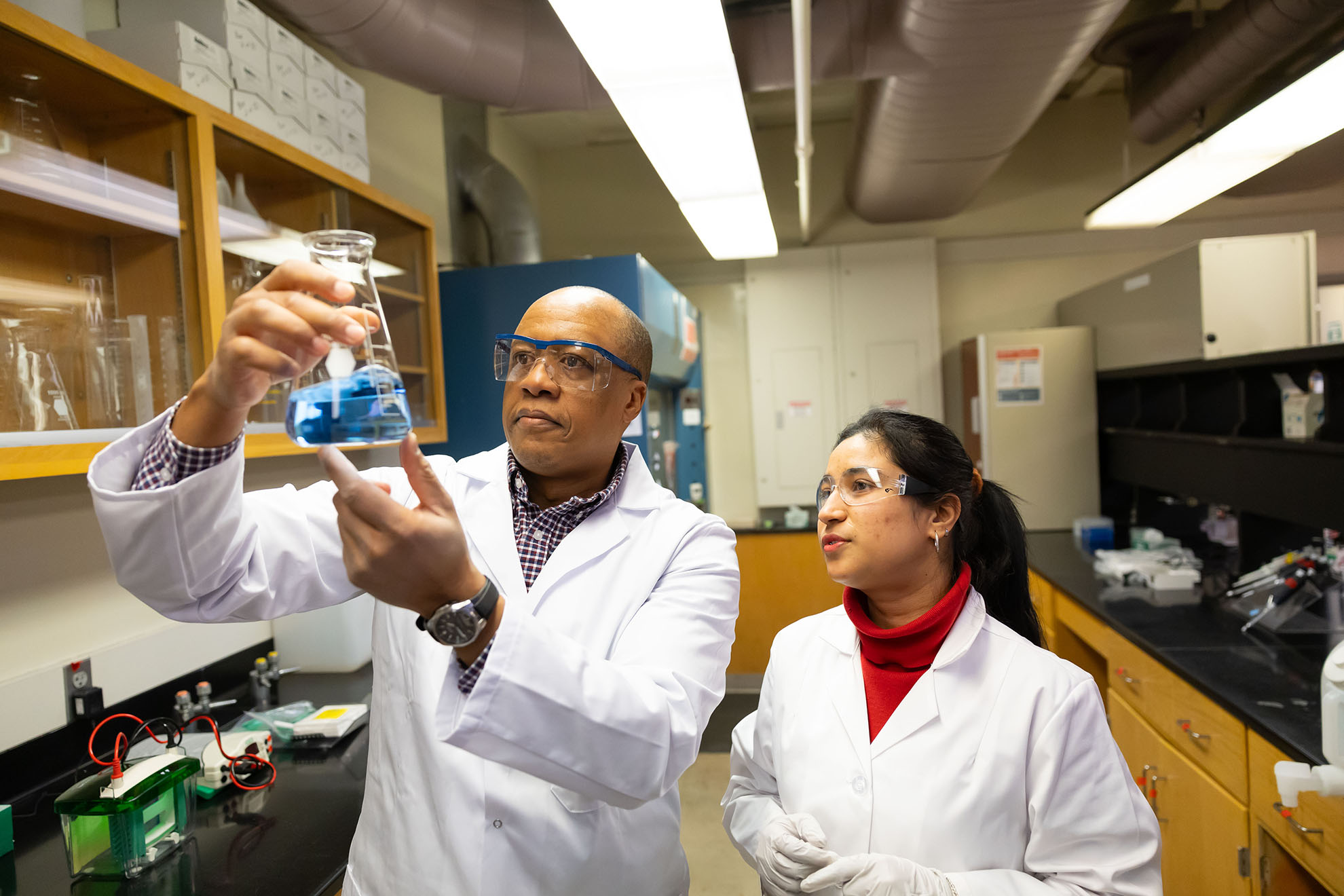
Walter Suza and postdoctoral research associate Sana Shakoor work to advance soybean growth and development at Iowa State University. (Photo credit: Iowa Soybean Association/Joclyn Bushman)
Unlocking soy’s heart-healthy properties
March 31, 2025 | Kriss Nelson
Investigating sterols in soybean growth and development
Among the leading causes of death, Alzheimer’s disease and heart disease consistently rank at the top. Could incorporating soybeans into our diet eventually lower the risk of these fatal diseases?
A new Iowa Soybean Research Center (ISRC) project is focusing on the potential of improving both human health and soybean plant health.
“Investigating the Specific Role of Sterols in Soybean Growth and Development” seeks to identify the genes responsible for making healthier phytosterols and explore their impact on soybean growth and development.
“We are utilizing checkoff and industry partners dollars to improve research and usability of soy,” says Morey Hill, Madrid-area farmer, past Iowa Soybean Association director and member of the ISRC Industry Advisory Council.
Led by Walter Suza Ph.D., George Washington Carver Endowed Chair and adjunct associate professor of agronomy, the project was awarded two years of funding last October.
“Support from ISRC is invaluable because the funds directly impact being able to do fundamental research and discovery in a crop of importance like soybean, which draws a direct connection between the research scientists and the farmers of Iowa,” Suza says.
For the health of humans
Sterols are components of the cell plasma membrane and serve as precursors to steroid hormones in humans and brassinosteroids in plants. Plants produce several types of sterols, such as campesterol, sitosterol, stigmasterol and cholesterol. Scientists call plant sterols and their derivatives, such as sterol esters, phytosterols.
Phytosterols show variability in their composition across different plant tissues, suggesting a specialized role in plant cell physiology. Suza says past research on plant sterols has deepened their understanding of plant physiology and contributed to research in humans.
“Because plants have genes similar to those involved in the cholesterol pathway in humans, research on phytosterols was instrumental in identifying a human gene involved in cholesterol biosynthesis,” he says. “This gene was later found to play a role in resistance to Alzheimer’s disease and neurodegeneration.”
In addition to advancing the understanding of gene function in humans, phytosterol consumption has been shown to reduce plasma cholesterol levels.
“High cholesterol levels, often linked to genetic predispositions and diets rich in cholesterol, are a major risk factor for heart disease,” says Suza. “By incorporating plant-based foods rich in phytosterols into their diets, individuals can have an additional means of reducing the risk of heart disease. Additionally, evidence suggests that consuming phytosterol-rich foods is associated with lower incidences of colon cancer, underscoring their broad health benefits.”
Through his research on the physiology of corn sterols, Suza says specific plants capable of accumulating health-promoting phytosterols have been identified.
“This discovery opens the door to exciting possibilities, particularly for soybeans, which are used in products like edamame, tofu and vegetable oils,” he says. “By applying the insights from corn sterol research to soybean breeding, it may be possible to develop varieties with increased levels of beneficial phytosterols in their grain.”
Such innovations could transform soy-based foods into functional products that offer nutritional value and promote heart health. When combined with regular exercise and appropriate cholesterol management strategies, these fortified foods could significantly reduce the burden of heart disease.
Hill says this project, which is supported through checkoff funding, seeks to benefit human and plant health.
“The Iowa Soybean Research Center is paving the way for the next generation of farmers who will feed our families for years to come,” Hill says. “Iowa State University is right in our backyard, and their efforts aim to benefit all individuals engaged in soybean production and utilization.”
Research for a better soybean
Because phytosterols help plants respond to stressors such as drought, salinity and cold, Suza’s research aims to contribute to varieties with optimal phytosterol composition.
“This might result in improved soybean varieties, better equipped to handle challenging weather conditions,” says Hill. “From an Iowa soybean farmer’s perspective, given high input costs and low commodity prices, anything that improves bean yields and overall soybean use benefits all farmers.”
Suza says the first step is identifying the genes that influence phytosterol composition in soybeans and understanding their roles in the crop’s growth and development.
“Understanding the function of the genes will enable us to develop soybeans with optimized phytosterol composition, enhancing their nutritional quality while improving their tolerance to environmental stresses,” he says. “This enhanced resilience, coupled with improved nutritional quality, will add value to the crop and create opportunities to increase profitability for growers.”
Contact Kriss Nelson at knelson@iasoybeans.com
Back